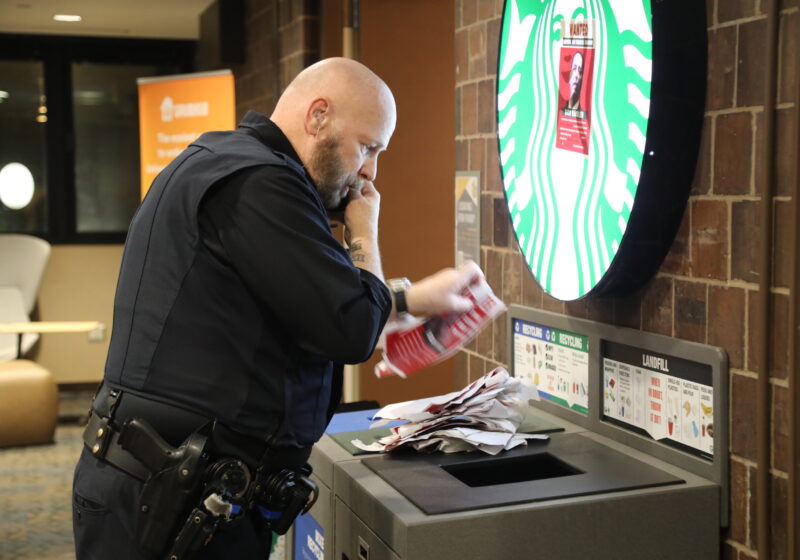Posters describing University affiliates as ‘wanted’ for involvement in the Israel-Palestine conflict were displayed throughout campus late Sunday night into early Monday morning.
Plastered in Wilson Commons, as well as campus academic buildings, residence halls, tunnels, elevators, and bathrooms, each poster featured an image of a University-associated individual, a set of targeted allegations, and an accompanying description.
Thirteen individuals were identified on the posters, including University employees, administrators, and members of the Board of Trustees. Each listed a number of attributed offenses — ranging from ties to Israeli institutions to claims of excessive force against student protestors.

Wanted posters found in the tunnel between Lattimore and Morey Hall. Those identified do not represent the full range of posters distributed. Photo: Teddy Almond, Staff Photographer.
“President Sarah Mangelsdorf openly supports the military organization that has murdered the family members of students, utilizing University resources to support these military efforts, while also blatantly disregarding academic values and democracy,” stated one poster.
The posters were not limited to current employees, with Assistant Director James Newell being the subject of one poster. Newell was criticized, among others, for “approach[ing] student protesters with decisive force such as pushing and choking,” read the poster.
Vice President of Student Life John Blackshear and Vice Provost and University Dean for Undergraduate Education Jeffrey Runner were also accused of alleged transgressions against student protestors.
“Vice Provost and University Dean for Undergraduate Education Jeffrey Runner compared saying the word ‘genocide’ about the situation in Gaza to ‘waving the confederate flag in front of a Black person’s face,’” stated the poster depicting Runner. “He later made a statement in the ‘Read This’ newsletter titled ‘Thanksgiving Shuttles / Spring Registration’ attempting to apologize. He never once says the word ‘sorry.’”
In the aforementioned newsletter, which was sent out last year on Nov. 12, 2023, Runner sent the following message: “I want to deeply apologize for the pain my words have caused — to my students, my faculty and staff colleagues, and to the broader campus community. I was wrong to suggest what a Black person might feel when confronted with a confederate flag or how a Jewish person might react to the word genocide […] My speech caused hurt that I accept full responsibility for.”
In April, members of the University’s Gaza Solidarity Encampment announced that the University had agreed to begin academic divestment, but University Communications later released a statement saying that no such commitments to academic divestment from Israel were or would be made.
The following week, student protestors staged a sit-in at Wallis Hall, protesting claims from the University’s chapter of Students for Justice in Palestine (SJP) of a unanimous vote against divestment by the Board of Trustees. Reflecting this, multiple posters condemned University officials for voting against academic divestment from Israel.
One poster stated that Board member Rich Handler “openly financially supports the IDF which has destroyed every university in Gaza and currently puts the lives of over 2,000,000 at risk,” additionally accusing Handler of having “financially coerced Handler Scholars into staying quiet about genocide.”
While certain posters alleged connections between professors and Israeli institutions — for instance, between Hajim Professor Eby Friedman and Technion’s Architectures and Circuits Research Center — others directly condemned Jewish faculty members for ties to Rochester-Modi’in. Rochester-Modi’in is a partnership between Rochester’s Jewish community and the Israeli city of Modi’in, which, according to their website, aims to “deepen the sense of belonging of all its practitioners to the Jewish people and the State of Israel.” Programs offered by the partnership include student exchange services, summer camps, and teachings on Judaism.
The posters provoked a mass response, with the majority of the posters being removed by University Facilities and the Department of Public Safety (DPS) by noon on Monday, though some reportedly remained up until late Monday night.
On Monday, in a statement to the University community, DPS Chief Quchee Collins called the act “unacceptable” and “vandalism to University property.”
“Any activities, including the placement of these posters, that disrupt our normal operations and classroom instruction will not be tolerated,” Collins stated. “Additionally, it seems that the goal of this vandalism is to intimidate members of our University community, which is an action that runs counter to our Meliora values.”
Multiple organizations released statements in response to the posters, including executive director of the University’s chapter of Hillel, Joy Getnick, who was also a target of the posters.
“These posters targeted senior administrators but also disproportionately targeted Jewish faculty and staff, including me. That is antisemitic, and hateful,” Getnick stated in an email to members of UR Hillel on Monday. “Now, more than ever, is a time to celebrate our shared heritage and traditions, and feel the strength of our special UR Jewish community.”
A statement released on UR Hillel’s Instagram mentions that efforts are being taken by local organizations such as the Rochester Jewish Federation, international organizations like the Anti-Defamation League — which, according to their website, seeks “to stop the defamation of the Jewish people and to secure justice and fair treatment to all” — and “many levels of law enforcement” to investigate the source and culprits of the posters.
In a statement released by the Office of the President on Tuesday, President Mangelsdorf described the act as “disturbing, divisive and intimidating and runs counter to our values as a university,” adding that, “We view this as antisemitism, which will not be tolerated at our University […] This goes against everything we stand for and we have an obligation to reject it.”
Notably, this is the first time that a University official has referred to an act committed on its campus as “antisemitic” in a written public statement.
Following administration’s response, the University’s chapter of Jewish Voice for Peace (JVP) released a counterstatement addressing widespread claims of the posters’ antisemitic intentions.
“Antisemitism is bigotry or hatred against Jewish people on the basis of their identity and we unequivocally oppose it,” the JVP statement read. “It is not, however, antisemitic to criticize the Israeli government and military that is committing war crimes.”
At this time, no group has claimed responsibility for Monday’s protest.
SJP declined to comment and have not released a statement as of publishing.
Students who may have information on the event were asked by Public Safety to contact them with any information, and those who may have been impacted by the incident were recommended to utilize the University CARE team.
None of the authors or editors of this piece are affiliated with any of the organizations mentioned in this article.









